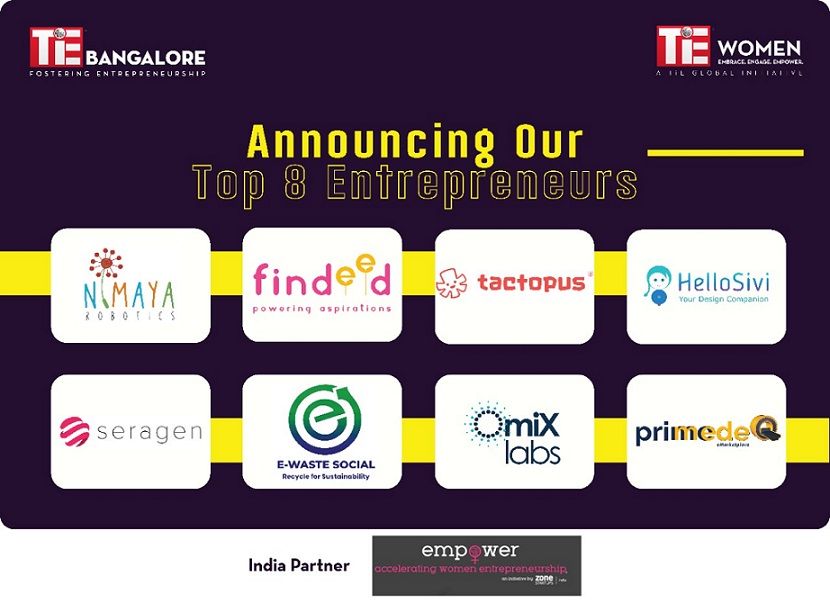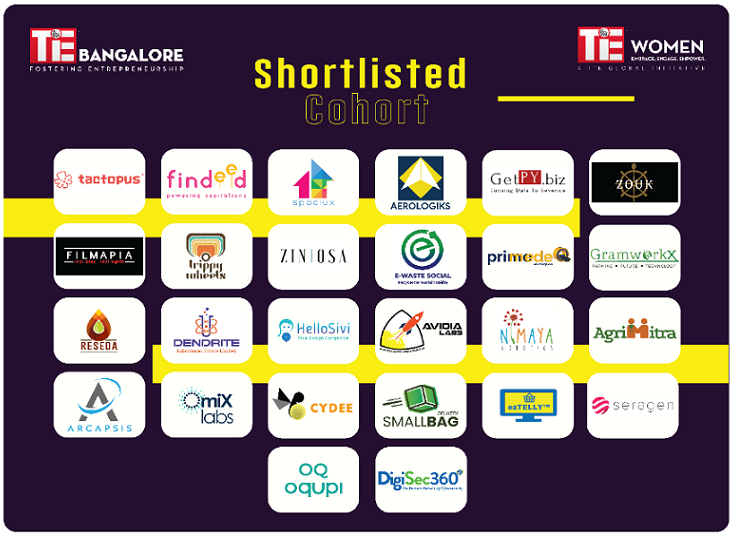Women entrepreneurship support initiative TiE Women Bangalore recently wrapped up its 2020 edition. There were seven workshops on agile innovation, business analytics, design thinking, fundraising, marketing, legal issues, and global expansion. Founders also interacted with a range of experts in a roundtable, and competed in a pitch round.
See Part I of our coverage of the eight winners, with insights on their product-market fit, traction, and adaptation to the pandemic era. In Part II, we featured industry leader perspectives on trends in women entrepreneurship and interactions with the participating founders.
In Part III, we share founder advice and pandemic resilience tips from 15 of the programme’s workshop leaders, mentors, industry experts, jurors, and speakers at the grand finale. See also our coverage of resilience activities during the pandemic by TiE Bangalore and TiE Global, and the TYE (TiE Young Entrepreneurs) programme.

Founder tips
Focusing on core problems, building out the right team, and managing cash flow are some key success factors in the long journey of entrepreneurship, according to Mahavir Sharma, Chairman of TiE Global Board of Trustees, and Co-founder of RAIN (Rajasthan Angels Network).
“Focus on your core competence, your core strength, and solve the problem in that domain. If you start to do too much or solve too many problems to acquire more customers, you lose focus, start burning more, and are doomed to fail,” he cautions. A strong core determines vertical growth without which broader expansions are not possible.
“Building and sustaining the right team, with the right focus, energy, vigour, and positivity is a must,” Mahavir adds. Many ideas have failed when the team was not right or their strengths were not directed well.
“Cash is king, cash flow has to be managed well. Smart money over easy money, or a combination of smart money with easy money are ways to go. One should make the interim need as small as possible, or go the debt route if necessary,” he explains.
Madhurima Agarwal, Director of Engineering Programmes and Leader of NetApp Excellerator at NetApp, offers inspiring advice: “Pursue your dreams, don’t let daily life detract you from living life. Believe in yourself and the power inside you to change the world.”
“Take all the help you can, there’s no need to be a superwoman always,” she adds.
“Spend as much time as possible with the problem before beginning to solve it. Be as specific as possible in defining the problem statement,” urges Ajith Sahasranamam, Founder of Ongil. Founders should build the right connections in the wider ecosystem before they even start.
“Choose the right geography for the problem that you are looking to solve, that could provide maximum tailwind. Relocate if necessary. This could save a lot of time and effort down the road,” he adds.
Entrepreneurship is a way of life, explains Vinutha Rallapalli, Director of T-Hub. “Be prepared for all the good, bad, and ugly that lie ahead. But the beauty of it is that no two days will really be the same,” she says.
Founders create impact and make a difference while learning something new about their own capabilities, the market, and business. “The learning is just immense. But be warned that excitement alone won't suffice,” she cautions.
“First find a problem worth solving. Then, be honest and figure out what makes you the best person to solve this problem,” Vinutha advises. Upskilling or tying up with a co-founder are important, and starting off the journey with small steps.
Founders should not have a “Do it Alone” mindset, says Geetha Ramamurthy, Chair of TiE Women and CEO of Ignite Career Confidence. Getting the right support, advisors, coaches, and mentors can help shorten the entrepreneur’s path to success.
“Have big plans, shoot for the stars,” she adds. The collaboration and connections that can be gained by a large but close network are invaluable. “Network. Network. Network,” she emphasises.

Abhay Tandon, Director and Head of Lowe’s Innovation Labs India, advises founders to work on solving an actual problem, especially one that creates a large impact. “Ensure that your approach involves lots of re-imagination, research, consumer empathy, and a complete data-driven attitude,” he urges. Entrepreneurs should also look beyond the immediate to the distant future.
Entrepreneurship is a way of life and entrepreneurs are made of risk-taking attitude, focused approach, and building high-performance teams, according to Priti Sawant, Founder and CEO of JoulesToWatts.
“It is important to create a circle of mentors to question, validate, and fine-tune your ideas as it is easy for an entrepreneur to fall in love with an idea that may turn out no to be viable or profitable,” she cautions.
“This is a golden time for Indian entrepreneurship. So, if you have a good idea and are passionate about it, capital will follow. Focus on scale and execution,” advises S Viswanatha Prasad, Founder and MD, Caspian Debt.
It is important to ensure that the customer is willing to pay for the solution, which is a good barometer for viability. “Build for scale from the start. Do not ignore dull and boring stuff on compliances and governance. Building a profitable company is more important than raising funds,” he adds.
Ankita Vashistha, Founder and CEO of Saha Fund, advises entrepreneurs to come up with unique and scalable solutions that solve real market problems. “Believe in your idea and get relevant industry experts and leaders to believe in you too and back you,” she adds.
Sandeep Kapoor, Founder and Managing Partner of Algo Legal, advises entrepreneurs to do an in-depth market analysis to figure out the potential for their offerings. “This kind of comparative research will also help crystallise the USP and stay ahead of unexpected challenges and risks,” he says.
Founders should take the plunge once this clarity is achieved. “There is never going to be a right time, right place, or the right opportunity. If you believe in your idea and think that it can make a difference in the market dynamics, one should have the courage to go out there and test the waters first-hand,” he adds. Patience and persistence also help in the long run.
Early identification of the problem with a defined customer segment is extremely important, agrees Ravikiran Annaswamy, Founder and CEO of Numocity Technologies. “Problem-solution fit happens early if there is collaboration with early customers. Every startup in early-stage needs to focus on this, and the rest will follow,” he says.
Founders should have a plan even if they are not seeking investors. “It should specify your goal and lay out at least a skeletal roadmap for how you'll get there. The plan will change as you progress and learn, but it will still help you stay focused and headed in the right direction,” advises Dr Chaitra Harsha, Managing Director, Vipragen Biosciences.
Aditya Kumar, APAC Head, HubSpot for Startups, advises founders to lead with data, and not with assumptions or someone else’s advice. Customer experience excellence in these times is key.
ALSO READ

Also Read
Resilience in the era of the coronavirus pandemic
The COVID-19 pandemic has turned things upside down for businesses and societies around the world. Kanika Radhakrishnan, Founder and CEO, Evergreen Valley Law Group, cites an inspiring quote by Andy Grove of Intel in this regard: “Bad companies are destroyed by crisis, good companies survive them, great companies are improved by them.”
“That should be the driving mantra. An ability to adapt and keep moving forward. If a pivot is what it takes, do it. Resilience is key,” she adds.
“Crisis situations are opportunities for entrepreneurs to rise to the challenge. Throughout history, we see evidence of this whether it is improved healthcare systems, technological innovations or adapting to new ways of life,” says Vinutha Rallapalli of T-Hub.
Humans can be fast to adapt. “Over the last six months, life as we knew it changed and changed so fast,” she explains, pointing to the building of strong sustainable processes and business pivots.
“As an entrepreneur, it becomes very important during these times to not get bogged down by all the negative news. Instead, look at the key strengths within you and your team to go solve the new problems that are begging to be addressed,” Vinutha advises.
An entrepreneurial mindset becomes all the more important as the pandemic rages, agrees Madhurima Agarwal of NetApp. “New challenges are faced constantly and there’s hardly any data that can point in the right direction for decision making. There’s chaos, fear, anxiety, and uncertainty all around,” she laments.
New problems need new ways of tackling them, and that is the playground of an entrepreneurial mind. “As people’s lives get upended, an entrepreneurial mindset brings in new ways to sustain and thrive,” she says.

“A true entrepreneur does not get impacted negatively by roadblocks like this, but understands the situation and quickly starts to move with what is required,” observes Mahavir Sharma of TiE Global.
That change could be to lie low, shut down a vertical, or move in a different direction – conversely, it could be tackling the challenge head-on and going full throttle. “A true entrepreneur has the urge to come out positive, learned, experienced, and driven from these circumstances and situations,” he adds.
“Innate entrepreneurial qualities and mindset help you face many challenges and obstacles with an open and flexible mind. They allow you to innovate to sustain the long journey of entrepreneurship,” observes Ankita Vashistha of Saha Fund. Strong leadership is the need of the hour.
An entrepreneurial mindset is one that is extremely vigilant of the changes that take place, according to Ajith Sahasranamam of Ongil. “An entrepreneur is always open to adapting. The pandemic has made it necessary for individuals, even if they are not entrepreneurs, to have these attributes,” he adds.
“Entrepreneurial mindset is useful in any situation, more so during the pandemic. In crises, the entrepreneurial mindset brings resilience and adaptability in the face of uncertainty. It helps in seeing opportunities amidst constraints,” says Vishwanatha Prasad of Caspian Debt.
Many business models will be disrupted or become obsolete in a matter of months. “Only an entrepreneurial mindset within an organisation can get companies through this time,” he adds.
The entrepreneurial mindset is one of pursuit, customer focus, and adaptability. “In the pandemic era, more and more entrepreneurs are introducing convenience, remote/in-home services and other innovative ideas that help meet the current problems and unique needs of their customers,” observes Geetha Ramamurthy of TiE Women.
The entrepreneurial zeal and approach of dealing with challenges swiftly and effectively are key during the pandemic, according to Sandeep Kapoor of Algo Legal. This entails looking for opportunities in these setbacks and turning them into successful ventures.
Resilience, agility and continued collaborations are valuable in these times. “The entrepreneurial mindset and skillset have never been more important in this chaotic and uncertain environment,” he adds.
The resilience to pivot quickly, optimise for great customer experience, and shedding the founder’s ego faster can go a long way for startups, according to Aditya Kumar of Hubspot. “The ability to maintain the status quo is a kind of negative disruption,” he adds.
“Entrepreneurs have become more resilient as acceptance to the fact that chaos and ambiguity are part of business making. The uncertainty has certainly brought out quick innovation,” observes Priti Sawant of JoulesToWatts. Entrepreneurs are wired to explore ideas, redesign business models, and solve changing problems.
“Winners in such times are persistent, perseverant, innovative, and constantly looking for solutions. Solve for the current and newly developing problems with a quick turnaround,” recommends Abhay Tandon of Lowe’s Innovation Labs India.
Founders can also balance the growing unemployment in the economy by creating more jobs. “Post persevering in this tide, they would be instrumental in the economic recovery and influx as well,” he adds.
“A problem-solving mindset with confidence to go for it will help in appreciating the new challenges, and also create or grow ventures out of these. These are unprecedented and yet apt times for real entrepreneurs to solve real problems,” says Ravikiran Annaswamy of Numocity Technologies.
The road ahead
As seen from the programme interactions and this three-part article series, TiE Women Bangalore taps a wealth of expertise and experience across the local business ecosystem, and offers valuable mentoring and networking opportunities for women entrepreneurs.
Mahavir Sharma of TiE Global commends the cohort graduates for spanning a wide range of industries, from health and education to agriculture and finance. “I am hopeful that their transformation into mainline scalable startups will be visible sooner than expected,” he says.
“The pipeline in tech education is speeding up and the gender gap is diminishing, and that will show up in the startup domain also,” he adds. More women are entering core tech domains and filing patents, with larger socio-economic impacts.
“With over 2,000 women-led or co-led participants across all chapters taking part in the TiE Women programme, I am hoping that a much higher percentage of them get funded from within the TiE network as well,” Mahavir signs off.
Edited by Saheli Sen Gupta
Want to make your startup journey smooth? YS Education brings a comprehensive Funding Course, where you also get a chance to pitch your business plan to top investors. Click here to know more.
Link : https://yourstory.com/2020/09/tie-women-bangalore-entrepreneur-tips
Author :- Madanmohan Rao ( )
September 15, 2020 at 07:20AM
YourStory


